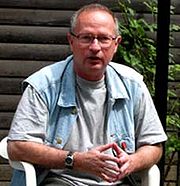
György Spiró
Encyclopedia
György Spiró (born April 4, 1946) is a dramatist, novelist and essayist who has emerged as one of post-war Hungary
's most prominent literary figures. He is a member of the Széchenyi Academy of Literature and Arts
.
 The son of an engineer from Miskolc
The son of an engineer from Miskolc
in eastern Hungary, he graduated in Hungarian and Slavic literature from the Eötvös Loránd University (ELTE) in 1970, and completed additional studies in journalism and sociology. His earlier career was spent in radio journalism. More recently, in addition to his writing, he has been employed as associate professor at the Department of World Literature and currently at the Institute of Art Theory and Media Studies at ELTE.
His plays have won numerous awards, including several for best Hungarian drama of the year. A few of them are available in English translation. The best known one is Chickenhead (1986), an earthy and bitter drama of a young delinquent's disillusionment at the longed-for reunion with his drunken father. Dramatic Exchange described it as "widely considered to be the most important Hungarian play of the last 20 years."
His avant-garde
style, depicting coarse language and characters outside the pale of respectability, often dismayed more traditional Hungarian critics.
His book, Az Ikszek (The X-s), which appeared in 1981, is a historical novel about the National Theatre of Poland in the first years of the 19-th century, with Wojciech Bogusławski as the main character. The novel is about the fight of the artists against censorship.
He published in 2005 an 800 page novel, Fogság (Captivity). Set in the Roman Empire
in the time of the Julio-Claudian dynasty, it follows the experiences of a Jewish wanderer named Uri. Spiró's earlier works eschewed Jewish themes, but in this work he returns to his ancestral roots.
In 2007, he published the rewritten Messiások (Messiahs), another historical novel. His most recent novel is the hugely successful Tavaszi tárlat (Spring exhibition, 2010), describing the early days of the Kádár
regime.
Hungary
Hungary , officially the Republic of Hungary , is a landlocked country in Central Europe. It is situated in the Carpathian Basin and is bordered by Slovakia to the north, Ukraine and Romania to the east, Serbia and Croatia to the south, Slovenia to the southwest and Austria to the west. The...
's most prominent literary figures. He is a member of the Széchenyi Academy of Literature and Arts
Széchenyi Academy of Literature and Arts
The Széchenyi Academy of Literature and Arts was created in 1992 as an academy associated yet independent from the Hungarian Academy of Sciences. It is intended to be the national academy of artists and writers, who could be elected to the HAS until the 1949 reforms. The president is Károly Makk,...
.

Miskolc
Miskolc is a city in northeastern Hungary, mainly with heavy industrial background. With a population close to 170,000 Miskolc is the fourth largest city of Hungary It is also the county capital of Borsod-Abaúj-Zemplén and the regional centre of Northern Hungary.- Geography :Miskolc is located...
in eastern Hungary, he graduated in Hungarian and Slavic literature from the Eötvös Loránd University (ELTE) in 1970, and completed additional studies in journalism and sociology. His earlier career was spent in radio journalism. More recently, in addition to his writing, he has been employed as associate professor at the Department of World Literature and currently at the Institute of Art Theory and Media Studies at ELTE.
His plays have won numerous awards, including several for best Hungarian drama of the year. A few of them are available in English translation. The best known one is Chickenhead (1986), an earthy and bitter drama of a young delinquent's disillusionment at the longed-for reunion with his drunken father. Dramatic Exchange described it as "widely considered to be the most important Hungarian play of the last 20 years."
His avant-garde
Avant-garde
Avant-garde means "advance guard" or "vanguard". The adjective form is used in English to refer to people or works that are experimental or innovative, particularly with respect to art, culture, and politics....
style, depicting coarse language and characters outside the pale of respectability, often dismayed more traditional Hungarian critics.
His book, Az Ikszek (The X-s), which appeared in 1981, is a historical novel about the National Theatre of Poland in the first years of the 19-th century, with Wojciech Bogusławski as the main character. The novel is about the fight of the artists against censorship.
He published in 2005 an 800 page novel, Fogság (Captivity). Set in the Roman Empire
Roman Empire
The Roman Empire was the post-Republican period of the ancient Roman civilization, characterised by an autocratic form of government and large territorial holdings in Europe and around the Mediterranean....
in the time of the Julio-Claudian dynasty, it follows the experiences of a Jewish wanderer named Uri. Spiró's earlier works eschewed Jewish themes, but in this work he returns to his ancestral roots.
In 2007, he published the rewritten Messiások (Messiahs), another historical novel. His most recent novel is the hugely successful Tavaszi tárlat (Spring exhibition, 2010), describing the early days of the Kádár
János Kádár
János Kádár was a Hungarian communist leader and the General Secretary of the Hungarian Socialist Workers' Party, presiding over the country from 1956 until his forced retirement in 1988. His thirty-two year term as General Secretary makes Kádár the longest ruler of the People's Republic of Hungary...
regime.

